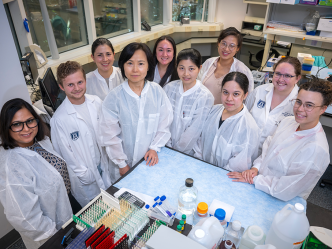To say a lot has changed since 1996, when Augusta University’s Dr. Steven Coughlin first released his book, Ethics and Epidemiology, is an understatement. Google has replaced the encyclopedia as a go-to source for school-aged children’s research, computers no longer require a hard-wired connection and people are more interested than ever in public health and taking better care of their minds and bodies.
In regard to epidemiology, the biggest change has been how professionals view the ethics around studies, especially those for HIV and AIDs, genomics and — even more recently — COVID-19.
Coughlin, interim head of the Division of Epidemiology in the Department of Population Health Sciences at the Medical College of Georgia, released the third edition of his book last fall to keep up with the ever-changing world, particularly in the health sciences. The updated version couldn’t have come at a more opportune time, both in relation to the COVID-19 pandemic and students’ increased interest in studying epidemiology. Augusta University also began offering a new Master of Science in Epidemiology last fall.
“I’m very pleased that the third edition was released. The contributors include experts in epidemiology, bioethics and health law from the United States and several other countries,” Coughlin said.
“Some of the contributors are current or former members of the American College of Epidemiology Ethics Committee, and I’m a previous chair of the ACE Ethics Committee and I currently serve on the board of directors of ACE. It provides an excellent overview of ethics in epidemiology and public health, and it’s updated from previous editions. For example, there’s been a lot of interest in public health ethics in the last decade, so public health ethics is addressed in the book.”
Readers around the world
The new edition also includes a topical chapter on genetics, HIV/AIDs and community-based research studies, and the chapter on ethical issues in genetics has been substantially re-written due to the developments in genomics in the last 10 years.
According to Oxford University Press, Ethics and Epidemiology has been an invaluable resource for practicing public health professionals and MPH students around the world. This third edition presents an international perspective of prominent epidemiologists, ethicists and legal scholars to address important ethical developments in epidemiology and related public health fields from the last decade, including the rise of public health ethics and the complex interrelations between professional ethics in epidemiology, public health ethics and research ethics.
New or updated chapters in Ethics and Epidemiology, Third Edition include ethical issues in public health practice, ethical issues in genetic epidemiology and ethical issues in international health research and epidemiology. Now updated with timely global examples, the book provides an in-depth account to the theoretical and practical moral problems confronting public health students and professionals and offers guidance for how justified moral conclusions can be reached.
The writing process
Whether it is writing a completely new book, as he has done with The Health of African Americans in the Southern United States — set for a summer 2022 release — or updating a previously published work, the process of getting a book published and out to the public can take a couple of years, according to Coughlin.
“The first step is to put together a draft outline of the book based upon a comprehensive literature review and to draft a proposal for the book that includes suggested chapter leads and an outline of the book, and the intended audience,” Coughlin said. “Then we reach out to potential contributors and invite them to contribute a chapter on a particular topic. So, it’s quite a bit of work coordinating the process. It takes a couple of years, generally.”
Contributions to research
On top of writing and editing his two books, Coughlin is also helping with more research at MCG and Augusta University, while also helping head up the newly launched Master of Science in Epidemiology.
“I’m a co-investigator on an interesting study led by Dr. Marlo Vernon at the Georgia Cancer Center, and we’re helping residents of public housing in Augusta to become more physically active and to stop smoking, to manage their weight, while also referring them for cancer screening,” said Coughlin.
“I’m also a co-investigator on a separate study that is led by Dr. Neal Weintraub in cardiology, and we’re looking at cancer outcomes among patients with cardiovascular disease using three national databases.”
Coughlin’s background in epidemiology includes 11 years with the Division of Cancer Prevention and Control at the Centers for Disease Control in Atlanta. He served as the senior editor and continues to serve on the editorial boards of several scientific journals, including Emerging Themes in Epidemiology and BMC Medical Ethics.
“I have an interest in social determinants of health, women’s health and veterans’ health,” Coughlin said. “We have done a lot of work on health disparities, like cancer survivorship among African American patients, but we look at social determinants of health such as low income, lack of access to health care, food insecurity, housing insecurity, those types of difficulties.”
 Augusta University
Augusta University




